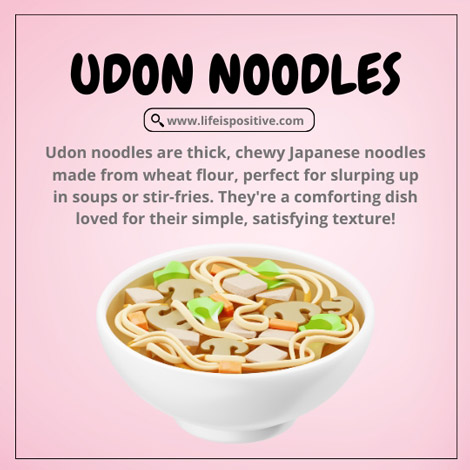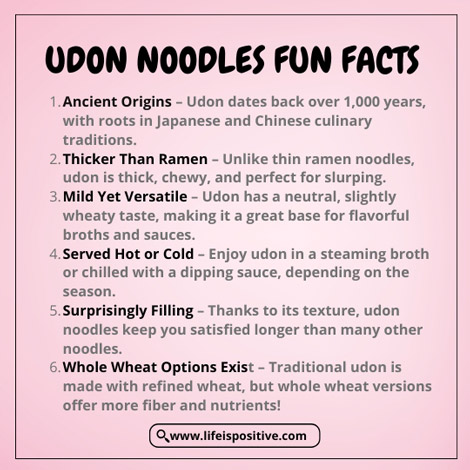|
Getting your Trinity Audio player ready...
|
Wondering if udon noodles are healthy? Let’s dive in and find out! Udon noodles, a popular Japanese dish, are often seen as comfort food, but are they a smart choice for your diet?
Packed with carbs, they provide a quick energy boost, but are they nutrient-rich or just a tasty filler? The truth is, it all depends on how you prepare them.
With the right ingredients, udon noodles can be part of a balanced, healthy meal. So, before you slurp that bowl, let’s break down the facts and see if these noodles are a worthy addition to your diet!
What Are Udon Noodles?
Ever taken a bite of something so satisfyingly chewy that it feels like a mini workout for your jaw—in the best way? That’s udon for you!
Udon noodles are thick, chewy, and downright slurp-worthy Japanese noodles made from wheat flour, water, and salt. They’re the ultimate comfort food—simple yet oh-so-satisfying. Unlike ramen, which tends to be thin and wavy, udon is all about that soft, bouncy bite.
Flavor-wise, udon noodles are mild and slightly wheaty, making them the perfect blank canvas for broths, sauces, and stir-fries. Whether swimming in a rich dashi broth or stir-fried with veggies, they soak up flavors like a champ.
So, if you’re craving a hearty, belly-warming dish that’s as versatile as it is delicious, udon noodles are your go-to. Ready to grab your chopsticks and dive in?
Read: Losing Body Fat Fast – Simple Hacks
Are Udon Noodles Healthy?
Let’s noodle our way through the top 5 health benefits of these delightful Japanese noodles.
1. Energy-Boosting Carbohydrates
Alright, let’s start with the basics. Udon noodles are primarily made of carbohydrates. “But wait,” you might think, “Aren’t carbs bad?” Not always!
Carbohydrates are the body’s primary energy source, essential for brain function, muscle activity, and overall vitality. A bowl of udon can replenish glycogen stores, keeping you sharp, focused, and ready to tackle your day.
Read: 4 Secret Nutritional Value of Blueberries
2. Digestive Health with Dietary Fiber
Traditional udon noodles may not win any fiber awards, but swap them for whole wheat udon, and now we’re talking! Fiber plays a key role in keeping your digestive system running smoothly—think of it as your gut’s personal trainer, keeping things moving and balanced.
A fiber boost means better digestion, improved gut health, and even longer-lasting fullness. So, if you want your udon to work smarter, not harder, go for the whole wheat version.
3. Low in Fat
Udon noodles are naturally low in fat, making them an excellent choice for those watching their fat intake.
When prepared in a simple broth or with light sauces, you’re in for a healthy treat. So, yes, in the realm of noodles, udon can be a leaner choice.
Read: How to Get Rid of Love Handles?
4. Source of Plant Protein
Okay, udon noodles won’t out-muscle a steak, but they do bring a solid dose of plant-based protein to the table. Pair them with tofu, eggs, or a heap of veggies, and boom—you’ve got a well-rounded, protein-packed meal.
When someone asks, “Are udon noodles healthy?” just remind them that they’re more than just carbs. With the right toppings, they become a legit protein source, keeping you full, fueled, and ready to take on the day—one slurp at a time!
5. Versatility for Balanced Meals
The real magic of udon? It has the ability to play well with just about anything. Toss in some colorful veggies, lean protein, and a light, flavorful sauce, and suddenly, you’ve turned these chewy noodles into a nutrient-packed powerhouse.
With the right mix-ins, udon transforms from simple comfort food to a balanced meal that fuels your body. So, go ahead—get creative, build a bowl that works for you, and enjoy every slurp guilt-free!
How To Make Udon Noodle Soup?
Let’s get simmering!
Ingredients:
• Fresh or dried udon noodles (about 200g)
• 4 cups dashi (Japanese soup stock)
• 2 tablespoons soy sauce
• 2 tablespoons mirin (sweet rice wine)
• 1 green onion, thinly sliced
• 1 small carrot, julienned
• A handful of baby spinach or bok choy, washed
• Optional: sliced mushrooms, boiled egg, or tofu cubes
Here’s How to Whip Up the Magic:
1. Prep the Broth: Combine the dashi, soy sauce, and mirin in a large pot. Let it simmer gently, allowing the flavors to mingle beautifully.
2. Noodle Time: In another pot, boil the udon noodles as per the packet instructions. Once done, drain and set aside.
3. Veggies Galore: Add the carrots to the simmering broth. If you’re using mushrooms or other veggies, toss them in, too. Cook until they’re tender.
4. Almost There: Add the spinach or bok choy to the pot. They’ll wilt quickly, so keep an eye out!
5. Serve It Up: Divide the cooked udon noodles among bowls. Pour the steaming broth over, ensuring each bowl gets a generous helping of veggies.
6. Final Touch: Garnish with sliced green onions. If you like, add a boiled egg or tofu cubes.
And there you have it! A bowl of heartwarming Udon Noodle Soup that promises a burst of flavor and comfort in every spoonful. It’s the culinary equivalent of a big, warm hug.
Read: 9 Genius Hacks for Curbing Hunger
Final Thoughts: Are Udon Noodles Healthy?
So, are udon noodles healthy? The short answer—yes, when done right! These thick, chewy noodles are a fantastic energy source, thanks to their carb content.
While traditional udon isn’t exactly a fiber superstar, opting for whole wheat versions gives your gut some extra love. Plus, when paired with lean proteins like tofu, eggs, or chicken, they turn into a well-rounded meal.
The key? Balance. Skip the heavy, sodium-packed sauces and load up on nutrient-rich toppings—think colorful veggies, lean proteins, and light broths. This way, you get all the comfort without the guilt.
At the end of the day, udon noodles are what you make them. Treat them as a base for a nutritious, satisfying meal, and they’ll fuel you up without weighing you down. So go on, build your perfect udon bowl—your taste buds (and body) will thank you!
For more empowering content, connect with our vibrant community here ➡️ Social Media.


